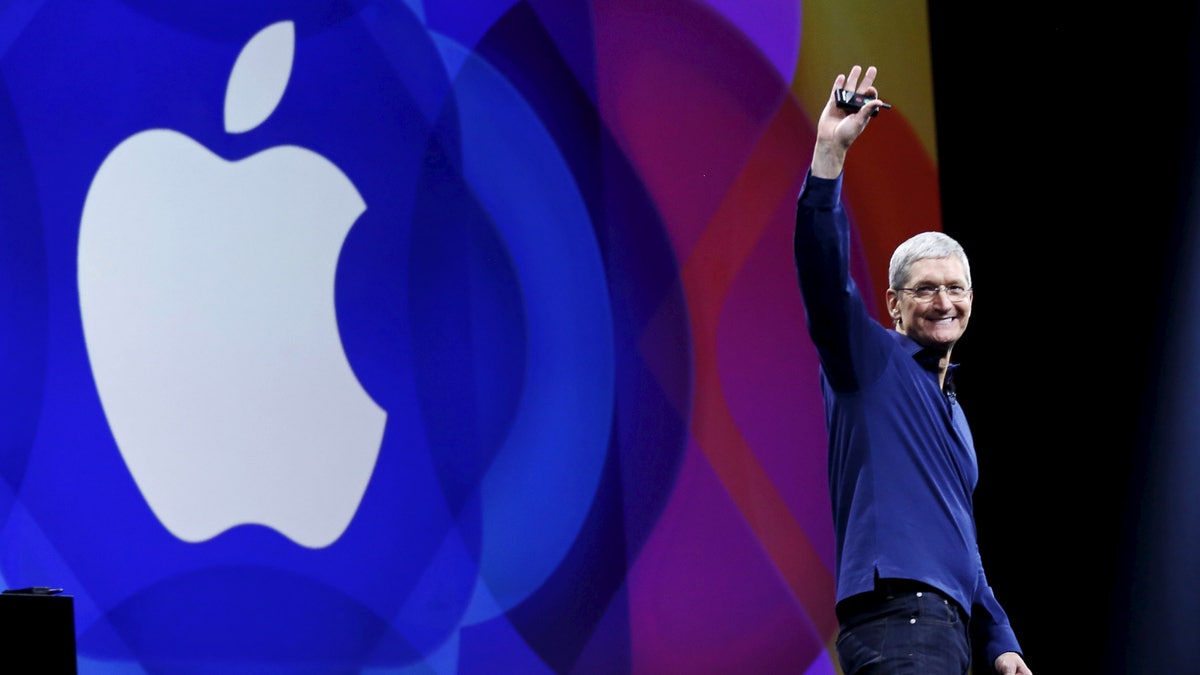
Apple CEO Tim Cook waves as he arrives on stage to deliver his keynote address at the Worldwide Developers Conference in San Francisco, Calif., June 8, 2015. (REUTERS/Robert Galbraith)
Apple unveiled its new music streaming service at the tech giant’s Worldwide Developers Conference (WWDC) Monday, ramping up the competition with Pandora and Spotify.
The service, Apple Music, is the tech giant’s latest move in an industry that it revolutionized with the launch of its iTunes store in 2003. Rumors of Apple wielding a new weapon in the music battle have been rife since the tech giant spent $3.2 billion to acquire Beats last year.
“Now you can search and stream the millions and millions of songs we have," said Eddy Cue, Apple’s senior vice president, launching Apple Music Monday. The tech titan has over 30 million songs in its Apple Music catalog.
Apple Music also features ‘Connect,’ a social media platform connecting artists to fans and Beats 1, Apple’s first radio station. “It's worldwide, it's live, it's coming from New York, L.A., and London,” said Cue.
Beats 1 will be led by DJs Zane Lowe in Los Angeles, Ebro Darden in New York, and Julie Adenuga in London.
Apple Music will be available June 30 as a free 3-month trial, after which a $9.99 monthly subscription fee will apply. A family membership for up to six family members will be priced at $14.99 a month. “Everyone gets their own account, their own library, their own recommendations,” said Cue.
An Android version of Apple Music will be available in the fall.
Famed music producer Jimmy Iovine took the stage at San Francisco’s Moscone Center to promote Apple Music, which he described as “a revolutionary music service curated by the leading music experts.” These experts, he explained, have created playlists carefully tailored to users’ music preferences.
Rapper Drake, sporting a vintage Apple jacket, also backed the service. “I can't wait to incorporate Apple Music and, especially Connect, into what I am doing,” he said.
The launch of an Apple streaming music service could have a major impact across the music industry, according to Jan Dawson, chief analyst at Jackdaw Research.
“Apple’s Music service is Apple’s attempt to save the music industry from itself once again, just as it did in 2003 with the iTunes Store,” she said, in a statement. “Then, the threat was piracy, but today the threat is free music streaming services. In both cases, Apple wanted to use its muscle and skills to convince people that music was still worth paying for.”
Apple’s customer base of over 400 million iPhone users could prove crucial in this battle, according to the analyst. “Apple is also in a unique position to combine the music people already own and have on their phones with the new music they’ll discover through streaming services, and the new Music service will do this,” she explained. “But Apple's new service feels like it's targeted as much at SoundCloud and YouTube as Spotify, with its focus on allowing even undiscovered artists to connect with fans.”
Apple Music was not the only news coming out of WWDC. Apple unveiled its new iOS 9 operating system Monday, touting a slew of enhancements, including new Siri search capabilities and iPad multitasking. The Cupertino, Calif.-based firm also launched El Capitan, its new OS X Mac operating system, and watchOS 2, the first major software update for Apple Watch.
Other announcements included enhancements to Apple Pay, which will support store-issued debit and credit cards with iOS 9. Apple also renamed its Passbook app as Wallet.
Follow James Rogers on Twitter @jamesjrogers




















